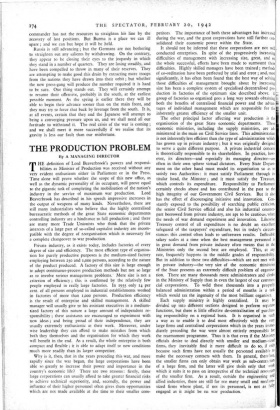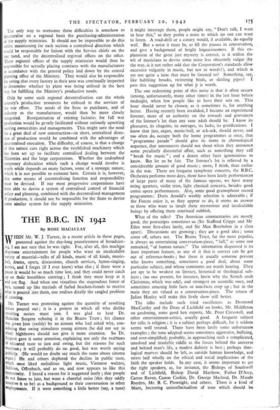THE PRODUCTION PROBLEM
By A MANAGING DIRECTOR
THE definition of Lord Beaverbrook's powers and responsi- bilities as Minister of Production was received without any very evident enthusiasm either in Parliament or in the Press. Time alone will prove whether the scope of this new office, as well as the dynamic personality of its occupant, will prove equal to the gigantic task of completing the mobilisation• of the nation's industry in the service of maximum war production. Lord Beaverbrook has described in his speech impressive increases in the output of weapons of many kinds. Nevertheless, there are still many industrialists who believe that the highly centralised bureaucratic methods of the great State economic departments controlling industry are a hindrance to full production ; and there are many more Trade Unionists who think that the private interests of a large part of so-called capitalist industry are incom- patible with the degree of reorganisation 'which is necessary for a complete changeover to war production.
Private industry, as it exists today, includes factories of every degree of size and efficiency. The most efficient type of organisa- tion for purely productive purposes is the medium-sized factory employing between 25o and r,000 persons, according to the nature of the product produced. A factory of this size is large enough to adopt continuous-process production methods but not so large as to involve serious management problems.' Mere size is not a criterion of efficiency ; this is confirmed by the relatively few people employed in really large factories. In 1935 only 14 per cent. of all persons employed in industrial establishments worked in factories of more than 1,000 persons. Production efficiency is the result of enterprise and skilled management. A skilled manager will usually give to his assistant executives in a medium- sized factory of this nature a large amount of independent re- sponsibility ; these assistants are encouraged to experiment with new ideas ; and being proud of their independence, they are usually extremely enthusiastic at their work. Moreover, under wise leadership they can afford to make mistakes from which both they themselves and the organisation for which they work will benefit in the end. As a result, the whole enterprise is both compact and flexible ; it is able to adapt itself to new conditions much more readily than its larger competitor.
Why is it, then, that in the years preceding this war, and more rapidly since the war began; the large corporations have been able so greatly to increase their power and importance in the country's economic life? There are two reasons: firstly, these large corporations can usually afford to take greater financial risks to achieve technical superiority, and, secondly, the power and influence of their higher personnel often gives them opportunities which are not made available at the time to their smaller corn-
petitors. The importance of both these advantages has increased during the war, and the great corporations have still further con. solidated their economic power within the State.
It should not be inferred that these corporations are not well conducted enterprises. In spite of the progressively increasing difficulties of management with increasing size, great, and on the whole successful, efforts have been made to surmount these difficulties. Highly skilled managers have been trained ; methods of co-ordination have been perfected by trial and error ; and, most significantly, it has often been found that the best way of solving those difficulties of • management brought about by increasing size has been a complete system of specialised decentralised pro- duction in factories of the optimum size described above. A group of factories so organised goes a long way towards obtaining both the benefits of centralised financial power and the advan- tages of individual management which are responsible for the inherently greater efficiency of the smaller unit.
The other principal factor affecting war production is the organisation of the great State economic departments. These economic ministries, including the supply ministries, are ad- ministered in the main on Civil Service lines. This administration is not inherently less efficient than the type of administration which has grown up in private industry ; but it was originally designed to serve a quite different purpose. A private industrial concern is theoretically responsible to its shareholders. In practice, how- ever, its directors—and especially its managing director—are often in their own sphere virtual dictators. Every State Depart- ment on the other hand must model its organisation so as to satisfy two Authorities: it must satisfy Parliament through its titular head, the Minister ; and it must satisfy the Treasury, which controls its expenditure. Responsibility to Parliament certainly checks abuse and has contributed in the past to the high integrity of our Government Civil Services. But it also has the effect of discouraging initiative and innovation. Con- stantly exposed to the possibility of searching public criticism, the senior Civil Service official and also his industrial counter- part borrowed from private industry, are apt to be cautious, when the needs of war demand experiment and innovation. Likewise Treasury control of all expenditure is no doubt an excellent safeguard of the taxpayers' expenditure, but in today's circum- stances this control often leads to unforeseen results. Inflexible salary scales at a time when the best management personnel is in great demand from private industry often means that in the Ministries only the second best are employed. This, at any rate, frequently happens in the middle grades of responsibility. But in addition to these two difficulties—which are not met with in private industry—the very size of the economic Ministries of the State presents an extremely difficult problem of organisa- tion. There are many thousands more administrators and clerks in the Ministry of Supply than in even the largest of our commer- cial corporations. To weld these thousands into a properly balanced administration within a period of months is a task which would tax the ingenuity of the most brilliant organiser.
Each supply ministry is highly centralised. It may be divided up into different sections designed to perform separate functions, but there is little effective de-centralisation of purchas- ing responsibility on a regional basis. It is organised in such a way as to enable it to deal most effectively with the very large firms and centralised corporations which in the years imme- diately preceding the war were almost entirely responsible for the rearmament programme. Thus it is that even if the Ministry officials desire to deal directly with smaller and medium-sized firms, they inevitably find it more difficult to do so, if only because such firms have not usually the personnel available to make the necessary contacts with them. In general, therefore, the smaller firms can only obtain war work as sub-contractors of a large firm, and the latter will give them only that work which it suits it to pass on irrespective of the technical resources of the smaller firm. As a result, outside the engineering and allied industries, there are still far too many small and medium- sized firms whose plant, if not its personnel, is not as full engaged as it might be on war production. The only way to overcome these difficulties is somehow to decentralise on a regional basis the purchasing-administration of the supply ministries. It should not be impossible to do this whilst maintaining for each section a centralised direction which would be responsible for liaison with the Service chiefs on the one hand, and the decentralised regional offices on the other. These regional offices of the supply ministries would then be responsible for actually placing contracts with the manufacturers in accordance with the general policy laid down by the central planning office of the Ministry. They would also be responsible for seeing that every factory in their area was continually inspected to determine whether its plant was being utilised in the best way for fulfilling the Ministry's productive needs.
Only by some such regional decentralisation can the whole country's productive resources be enlisted in the services of the war effort. The needs of the State as purchaser, and of industry as the manufacturer, would then be more closely integrated. Reorganisation of existing factories for full war production would be greatly facilitated without seriously upsetting existing ownerships and managements. This might save the need for a great deal of new construction—in short, centralised direc- tion of production would be combined with the advantages of decentralised execution. The difficulty, of course, is that a change of this nature cuts right across the established machinery which has been set up to facilitate centralised dealing between the Ministries and the large corporations. Whether the undoubted temporary dislocation which such a change would involve is worth while 'depends on many factors, some of a strategic nature, which ft is not possible to estimate here. Certain it is, however, that some means of decentralising function and responsibility must be devised. If our most progressive corporations have been able to devise a system of centralised control of financial policy and planning, combined with the decentralised management cif production, it should not be impossible for the State to devise some similar system for the supply ministries.



























 Previous page
Previous page